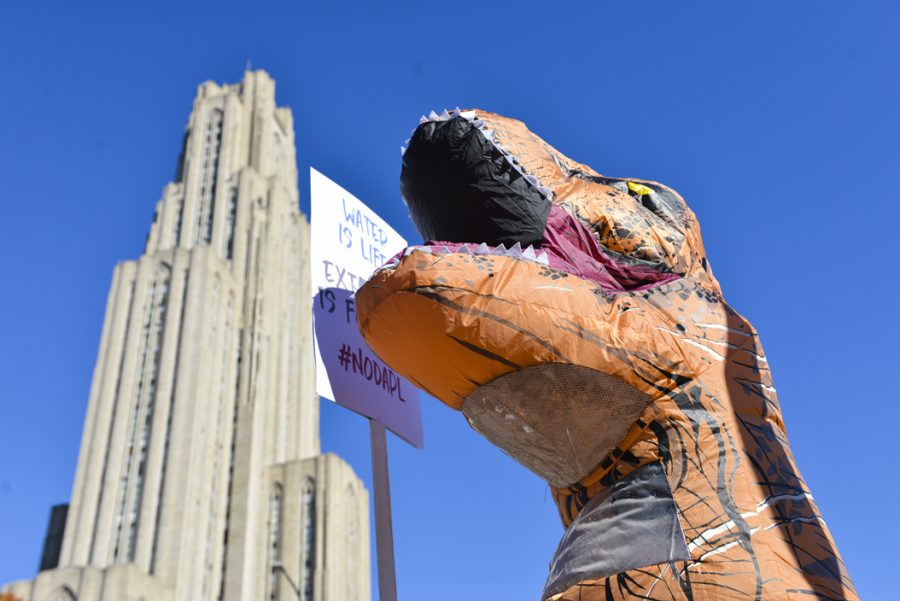Kimberly Muffett-Smith, a Washington County resident who is part Native Lenape Indian, spent the last weekend in October worrying about her daughter’s safety.
Muffett-Smith’s daughter was arrested Oct. 27 in Standing Rock, North Dakota, when she chained herself to equipment in protest of the Dakota Access Pipeline. She was held in jail from Thursday through Saturday night, worrying Muffett-Smith for several days.
Beyond her daughter’s predicament, Muffett-Smith said she’s concerned about all those involved in the protest against the 1,134-mile pipeline meant to deliver oil from the Bakken oil fields in North Dakota to Patoka, Illinois.
“I have a special connection to Standing Rock,” she said, echoing a Bernie Sanders line. “It’s a spiritual thing, and every time those people get hurt out there, I hurt here.”
Muffett-Smith joined about 75 other people in Schenley Plaza to protest the pipeline from afar Saturday, including students, children, environmental activists, Native Americans, socialists and supporters of Green Party presidential candidate Jill Stein. Some dressed in issue-appropriate themed costumes, including a dinosaur costume representing the possible extinction of Native Americans.
Solidarity protesters chanted “We stand with Standing Rock,” and “In the ground/safe and sound,” from 11 a.m. to 2 p.m. in the Plaza. The group encouraged drivers passing by to honk in support and toted signs with slogans such as “Water is life.” It took about three protesters at a time to heave a tube-like, makeshift black snake above their heads — an artistic representation of the pipeline.

Later on in the day, as more people showed up and the brisk wind subsided, the chants shifted tone and focused more on those involved in the construction of the DAPL. Protesters started to chant, “Businessmen can go to hell/We say no to DAPL” and “Corporations are too greedy/It’s the law to honor treaties.”
Daisy Wise, 45, organized the event and said that although she works in animal rescue, the issues in Standing Rock resonate with her because she has been a social justice activist her entire life.
Wise, who lives in Cranberry, plans to make the trip to North Dakota to continue her protests on the front lines. She described the situation in Standing Rock as “a human rights nightmare” and sees no room for compromise with those in favor of the pipeline.
“We have to move towards clean energy,” Wise said. “Why the hell would we be building something that’s supposed to last for years and years when we’re supposed to be moving away from that?”
The Fortune 500 natural gas and propane company Energy Transfer Partners is building the Dakota Access Pipeline to transport domestically produced crude oil to refineries in Illinois, as opposed to using trucks or railcars to ship the oil.
Supporters of the DAPL point to the jobs made available by the oil industry and the possibility of energy independence. Proponents see a future void of renewable energy and a continued reliance on oil production.
Since early spring, Native American protesters and non-Native American advocates — collectively known as “water protectors”— have been protesting the construction of the pipeline out of concern that it could taint the area’s water supply.
Currently, 90 Native American tribes and many more protesters are gathered at Standing Rock Reservation in North Dakota where Energy Transfer Partners are attempting to build the oil pipeline. While protests have remained relatively peaceful, tensions have risen mainly due to police action to forcibly remove water protectors from the construction area.
Native Americans from the Standing Rock Sioux tribe point to a 1851 treaty that grants them the land over which Energy Transfer Partners is building the pipeline.
Awareness of the issues surrounding the DAPL has increased dramatically over the past month through social media campaigns such as “checking in” to Standing Rock on Facebook. By “checking in” people can mark their current location or — as with Standing Rock — to indicate their solidarity with the residents of a place, even if they can’t physically be there.
Jen Kreisher, a junior business major at the Community College of Allegheny County, came to the event in an effort to educate others about what she described as a “massive human rights violation.”
“I really would like to see more people becoming more informed and caring about the issue,” Kreisher said. “I understand that physically holding a protest right now doesn’t change anything in the moment, but awareness changes everything.”

First-year industrial engineering major Jacob Richards said he hoped the protest would lead to a domino effect of community involvement.
“I hope this leads to knowledge,” Richards said. “Hopefully the more people that know about it will try to make a difference.”
In an ideal future for Wise, all people in the United States would show support for the Native tribes. Wise was especially concerned with the way police have responded to the protestors in Standing Rock, referring to medics who were arrested helping the water protectors and the use of tear gas.
“There has to be solidarity. We have to all get together. And we see people who are peaceful, looking at police saying ‘I pray for you, I forgive you, I love you,’” Wise said. “The situation [in Standing Rock] is bleeding out, and [the solution] can’t be a Band-Aid.”
Many of the protesters at Schenley Plaza expressed disdain that both major presidential candidates — Republican candidate Donald Trump and Democratic candidate Hillary Clinton –– have not discussed the issue more. Kreisher said that in light of the upcoming presidential election, the candidates should spend more time discussing the pipeline and renewable energy.
As the chants of “You can’t drink oil,” drowned out later in the afternoon, the protesters signaled they wanted a better — or more sustainable — solution than the proposed DAPL.
Wise was fed up with waiting for a compromise.
“As human beings, we have to stop asking for crumbs — I want the loaf,” Wise said.



